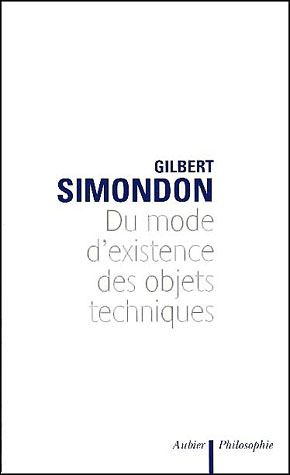Gilbert Simondon: Being and Technology (2012)
Filed under book | Tags: · ontology, philosophy, philosophy of technology, technical object, technology, transduction, transindividual

“The first sustained exploration of Simondon’s work to be published in English.
This collection of essays, including one by Simondon himself, outlines the central tenets of Simondon’s thought, the implication of his thought for numerous disciplines and his relationship to other thinkers such as Heidegger, Deleuze and Canguilhem.
Complete with a contextualising introduction and a glossary of technical terms, it offers an entry point to this important thinker and will appeal to people working in philosophy, philosophy of science, media studies, social theory and political philosophy.
Gilbert Simondon’s work has recently come to prominence in America and around the Anglophone world, having been of great importance in France for many years.”
Contributors: Miguel de Beistegui, Elizabeth Grosz, Anne Sauvagnargues, Bernard Stiegler, Igor Krtolica, Jean-Hugues Barthélémy, Yves Michaud, Sean Bowden, Dominique Lecourt, and the editors.
Edited by Arne De Boever, Alex Murray, Jon Roffe, Ashley Woodward
Publisher Edinburgh University Press, 2012
ISBN 074864525X, 9780748645251
236 pages
via lastobserver
review (Wil Kaiser, H-Net Reviews)
Comments (3)Bernard Stiegler: Technics and Time, 1: The Fault of Epimetheus (1994–) [EN, ES]
Filed under book | Tags: · anthropology, metaphysics, ontology, philosophy, technical object, technics, technoscience, time

“What is a technical object? At the beginning of Western philosophy, Aristotle contrasted beings formed by nature, which had within themselves a beginning of movement and rest, and man-made objects, which did not have the source of their own production within themselves. This book, the first of three volumes, revises the Aristotelian argument and develops an innovative assessment whereby the technical object can be seen as having an essential, distinct temporality and dynamics of its own.
The Aristotelian concept persisted, in one form or another, until Marx, who conceived of the possibility of an evolution of technics. Lodged between mechanics and biology, a technical entity became a complex of heterogeneous forces. In a parallel development, while industrialization was in the process of overthrowing the contemporary order of knowledge as well as contemporary social organization, technology was acquiring a new place in philosophical questioning. Philosophy was for the first time faced with a world in which technical expansion was so widespread that science was becoming more and more subject to the field of instrumentality, with its ends determined by the imperatives of economic struggle or war, and with its epistemic status changing accordingly. The power that emerged from this new relation was unleashed in the course of the two world wars.
Working his way through the history of the Aristotelian assessment of technics, the author engages the ideas of a wide range of thinkers—Rousseau, Husserl, and Heidegger, the paleo-ontologist Leroi-Gourhan, the anthropologists Vernant and Detienne, the sociologists Weber and Habermas, and the systems analysts Maturana and Varela.”
Originally published in French under the title La Technique et le temps. Vol. 1: La faute d’Epiméthée, 1994.
English edition
Translated by Richard Beardsworth and George Collins
Publisher Stanford University Press, 1998
ISBN 0804730415, 9780804730419
316 pages
Technics and Time 1: The Fault of Epimetheus (English, 1998, updated on 2012-7-19)
La tecnica y el tiempo, I. El Pecado de Epimeteo (Spanish, updated on 2012-7-19)
Gilbert Simondon: On the Mode of Existence of Technical Objects (1958–) [FR, EN, ES]
Filed under thesis | Tags: · individuation, philosophy, philosophy of technology, technical object, technics, technology

“The purpose of this study is to attempt to stimulate awareness of the significance of technical objects. Culture has become a system of defense designed to safeguard man from technics. This is the result of the assumption that technical objects contain no human reality. We should like to show that culture fails to take into account that in technical reality there is a human reality, and that, if it is fully to play its role, culture must come to terms with technical entities as part of its body of knowledge and values. Recognition of the modes of existence of technical objects must be the result of philosophic consideration; what philosophy has to achieve in this respect is analogous to what the abolition of slavery achieved in affirming the worth of the individual human being.
The opposition established between the cultural and the technical and between man and machine is wrong and has no foundation. What underlies it is mere ignorance or resentment. It uses a mask of facile humanism to blind us to a reality that is full of human striving and rich in natural forces. This reality is the world of technical objects, the mediators between man and nature.” (from the Introduction)
French edition
Preface by John Hart
Afterword by Yves Deforge
Publisher Aubier, Paris, 1958, 1969, 1989
ISBN 2700718518
English edition, Part I
Translated by Ninian Mellamphy
With a preface by John Hart
Publisher University of Western Ontario, June 1980
98 pages
Commentary (EN)
Du mode d’existence des objets techniques (French, 1958/1969, added on 2014-4-21)
On the Mode of Existence of Technical Objects, Part I (English, trans. Ninian Mellamphy, 1980, added on 2014-4-21). Different version (updated on 2012-8-23).
Du mode d’existence des objets techniques (French, 1958/1989, no OCR, updated on 2014-4-21)
El modo de existencia de los objetos técnicos (Spanish, trans. Margarita Martinez and Pablo Rodriguez, 2007, added on 2014-4-21)

